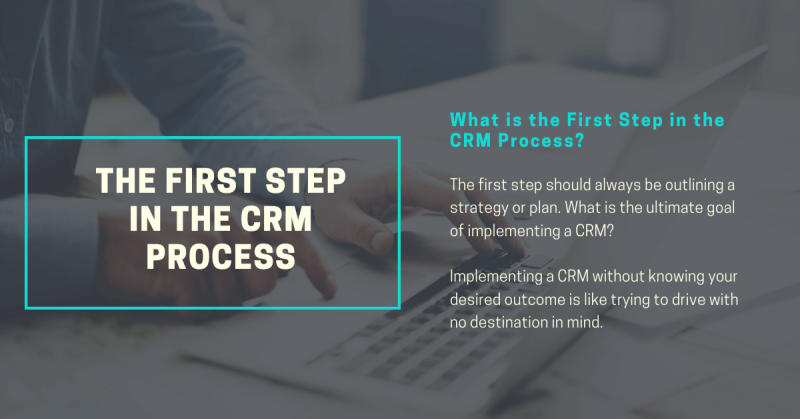
- What is the First Step in the CRM Process?
- The Benefits of Implementing a Successful CRM Strategy
- Define Your Company's CRM Strategy
- Identify the Right CRM System for Your Business
- Create a Plan for Implementation and Execution of Your CRM Strategy
- Create a Timeline and Budget for Your CRM Implementation
- Implement the CRM System, Train Employees, and Monitor Progress
- Common Mistakes Companies Make When Using Your New CRM System and How to Avoid Them
- Conclusion
Do you want to know how to implement a CRM (customer relationship management) strategy that will drive success? Implementing a CRM solution in your business is essential if you are looking for high productivity, increased customer satisfaction rates, and greater profitability. In this blog post, we will discuss CRM implementation and strategies so you can have the best possible outcome when implementing your own CRM solution.
What is the First Step in the CRM Process?
The first step should always be outlining a strategy or plan. What is the ultimate goal of implementing a CRM? Implementing a CRM without knowing your desired outcome is like trying to drive with no destination in mind.
Having a plan in place will serve as a roadmap to achieving your CRM goals for the strategies you have outlined.
This blog post will cover CRM implementation and provide tips to help you have a successful CRM strategy.
I would also recommend reading the 13 Critical Components of CRM Architecture for Businesses, as this is a core part of mapping your CRM strategy.
The Benefits of Implementing a Successful CRM Strategy
Implementing a successful CRM has many benefits when creating a strategy, following a plan, and having clear goals that you want to achieve.
What are the benefits of CRM software?
- Empower your team with the latest updates about customer engagement and activity.
- Automate communication with your customers.
- Reduce costs associated with data collection, storage, and analysis.
- Decrease time spent on mundane tasks like updating contact information, following up with emails and text messages, administrative tasks, and much more.
- Streamline and automate customer service department operations.
- Ensure accuracy of records and better service through detailed customer tracking.
- Increase sales by delivering personalized offers to each customer.
- Increase profitability and see a quick ROI.
- Focus on the right prospects by crafting personalized campaigns that convert.
These are just some of the many benefits that CRM and marketing automation software can deliver when you have a CRM strategy, and it's implemented correctly.

Define Your Company's CRM Strategy
Before you get started, you need to define your company's CRM strategy. This is what will guide you throughout the entire process. The first step in this process is defining the business objectives or goals for implementing a CRM system and then determining how these can be measured. From there, decide who should have input on the project (e.g., Sales Management, Marketing Department).
Next, create measurable deliverables tied to business objectives and break them into manageable milestones with deadlines so that they don't get lost in the shuffle of other projects within your organization. Once these milestones are defined, it becomes much easier to measure success/failure and show ROI over time.
Here at Pulse Technology, we understand that this can be an overwhelming task, and we're here to help! So contact us today to get started on creating a CRM strategy that works best for your company.
Identify the Right CRM System for Your Business
It's essential to identify what CRM system will work for you and your company. The first step is determining the needs of your organization. What are you trying to accomplish? Do you need sales, marketing, and customer service software or an event registration system? Or maybe, something more comprehensive?
Here are a few things you should consider:
- Your customer journey and what processes you currently use to deliver a great customer experience. How will the CRM software you choose help to simplify these processes?
- What key performance indicators (KPIs) do you need to track?
- How will your current sales process be used in the CRM, and how will the marketing automation features help close more sales?
Next, figure out which features will be most beneficial to you and how much you have to budget for implementation costs. How big is your team at this point? Some systems have been designed specifically with small businesses in mind, while others can accommodate large teams.
Here at Pulse Technology, we've helped companies of all sizes get their CRM setup and have implemented internal processes to streamline this process, saving our customers a ton of time and money. If you're a small business or startup, we can often get you set up and going for free, which is included in the low monthly subscription price starting at $49 per month. Reach out today if you would like to learn more.
Let Us Help You Get Started!
Pulse CRM delivers more than software. We’re your partner in success.
We fully set up your CRM, including importing your data, configuring sales and marketing automations, designing branded email templates, writing engaging email copy, setting up sales pipelines, and much more.
Create a Plan for Implementation and Execution of Your CRM Strategy
This is one of the most critical parts. You need to create a realistic plan for how you're going to get your CRM up and running as soon as possible. We recommend blocking out time each week dedicated to the execution of the CRM plan.
Your CRM plan will also depend on the size of your company and the processes you have in place. For example, a large company with an established marketing department will likely be able to get their CRM up and running faster than a small startup just starting out.
One thing is for sure; you need a plan in place to get your CRM strategy and implementation across the finish line.
Create a Timeline and Budget for Your CRM Implementation
Having a clear timeline and budget is crucial to improving the success of your CRM software implementation.
One vital thing is to understand is what the costs will be as your business grows. Many CRM systems have low entry prices or even free plans to get you signed up with them, but once your company grows, these costs can escalate and will sometimes far exceed your budget. So you must think about your future growth and the costs associated with this growth.
Here at Pulse Technology, we don't charge per module, so there are no hidden costs, and you won't be caught off guard with any unexpected expenses.

Implement the CRM System, Train Employees, and Monitor Progress
Now that you have your plan, CRM strategies, and timeline mapped out; it’s time to implement your CRM system. Implementing the CRM is all about getting employees trained and onboard with using your new CRM system.
Another significant component of implementing the CRM is monitoring progress throughout the process - especially when business starts booming! Of course, everyone knows having a successful implementation plan means making sure everything stays organized as expected, but since most companies don't have a CRM strategy, you could end up in the weeds.
To avoid getting lost when implementing your company's new CRM system, make sure to set goals for what each business department is responsible for during implementation and follow all the steps outlined in this blog post!
Common Mistakes Companies Make When Using Your New CRM System and How to Avoid Them
Here are a few common mistakes we see companies making:
- Not being prepared for how they'll transition from their old systems to their new CRM system.
- Expecting instant results when implementing a CRM strategy and not remembering that it takes time before you start seeing any benefits of using this type of software.
- Focusing only on sales and marketing instead of other areas within the business, like customer service.
- Not having anyone dedicated to implementing it in a way that will change how your organization functions day-to-day.
To avoid these common mistakes, we recommend considering what you want from your CRM before implementation by asking yourself: What do I need from my new CRM? How should this help me achieve those goals? If there are any constraints with time or funding, make sure they're taken into account when deciding which features are most important for you and building an actionable roadmap to get there.
Successful implementation means more than just setting up the software but ensuring everyone knows what is expected upon rollout!
Let Us Help You Get Started!
Pulse CRM delivers more than software. We’re your partner in success.
We fully set up your CRM, including importing your data, configuring sales and marketing automations, designing branded email templates, writing engaging email copy, setting up sales pipelines, and much more.
Conclusion
If you’ve read this blog post and are still undecided about whether or not to invest in a CRM, we hope that our insights have given you some clarity. A successful CRM strategy is an investment, but it can pay off big time if done right. We provide affordable pricing for startups and enterprises and can assist you with your CRM implementation strategy. So contact us today to get started!





